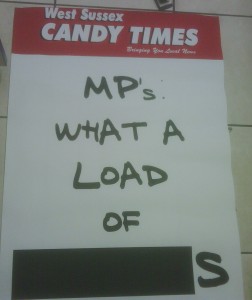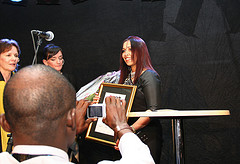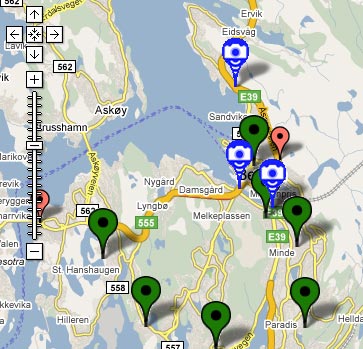James Murdoch’s speech at the MediaGuardian Edinburgh International Television Festival on Friday, titled ‘The Absence of Trust,’ concluded that ‘the only reliable, durable, and perpetual guarantor of independence is profit’. The News Corp (Europe and Asia) chairman and chief executive’s proclamation that the scale and scope of the BBC’s activities and ambitions are ‘chilling’ caused the most comment among the media critics, not least from the BBC’s Robert Peston…
For related content see:
- Emily Bell, MediaGuardian: ‘The BBC is not the problem – it’s an inability to let go of the past’
“The BBC’s significant and sprawling web presence in the UK does indeed soak up potential news audience time rather than advertising, but it is highly dubious whether it is in itself the largest obstacle to charging for online content.”
“The BBC’s business editor, Robert Peston, was involved in an astonishing slanging match with James Murdoch following the News Corporation chief’s speech to television executives in Edinburgh where he accused the BBC of mounting a ‘land grab’.”
- Peston’s Picks: Richard Dunn Memorial Lecture, given at the MediaGuardian Edinburgh International Television Festival by Robert Peston, on Saturday 29 August 2009: What future for media and journalism?, updated in light of Murdoch’s comments.
“Now I wrote all this before hearing James Murdoch’s passionate call in his MacTaggart Lecture for the dismantling of the BBC and the near total liberalisation of the media. But if there is a thread running through my lecture, it is this. Market-based democracies like ours need two kinds of essential infrastructure: robust financial systems that transmit cash and allocate capital where it will be most useful; and competing independent news groups that distribute impartial information so that people can take control of their lives and rein in the over-mighty.”
“James Murdoch’s swingeing attack on the BBC divided senior industry executives at the Edinburgh television festival yesterday.”
- George Eaton, the New Statesman: ‘A Cameron-Murdoch alliance could devastate the BBC’
“[T]his year with a Tory Party increasingly sceptical of the BBC’s scope and scale on the brink of power, the corporation faces the threat of a powerful alliance between Cameron’s Conservatives and Murdoch’s News Corporation.”
Full speech text below:
2009 Edinburgh International Television Festival
MacTaggart Lecture
James Murdoch
28 August 2009
THE ABSENCE OF TRUST
Good evening and thank you for having me here tonight. Thanks also to Tim for those kind words of welcome.
I think this is the first time that someone who has delivered the alternative MacTaggart has graduated – if that’s the right word – to the real thing.
So I am both proud and honoured to be paving the way for Ant and Dec, who should be standing here tonight in 2018 if this trend continues.
Of course I’m flattered to be asked, but I am also a little worried. Does this finally mark my invitation to join the British broadcasting establishment?
While that thought does terrify me, I am comforted in the knowledge that after my remarks my membership will have been a brief one…
And it also occurred to me that I qualified for the invitation only after I gave up my executive role at Sky. I now spend most of my time engaged in other parts of the world and other parts of the media industry. Perhaps that means I am regarded as being safely at a bit of a distance.
But I do welcome the opportunity to talk to you all about the media in the UK – and a slight distancing might help.
You can be the judges of that.
When we gather as an industry, it’s natural for us to talk about the future. I’d like to do something different tonight: to turn our focus firmly to the present. Because the path we are already on is a dangerous one.
In particular, what I want to discuss is our digital present that is right here – it has been here for a while, in fact. A digital present that ought to compel us to make some urgent choices about where we want to go as an industry and as a society: choices which, I will argue tonight, we are currently either avoiding or mishandling.
It’s easy to lose sight of how digital we already are.
The inescapable thing about the present is that everything in it is already digital. Even if part of the consumption of media remains in the analogue world – opening a newspaper or a book, going to see a film in a cinema – the production of those creative works is already wholly digital, and the proportion that is consumed by digital means is growing all the time.
So talking about a coming digital future, or a digital transformation, is to ignore the evidence that it has already happened.
Why do I think we are getting this wrong? Why do I believe we need to change direction as a matter of urgency? It’s quite simple.
Because we have analogue attitudes in a digital age.
We have business models and a policy framework based on spectrum scarcity.
We have limited choice, and we have central planning.
The result is lost opportunities for enterprise, free choice and commercial investment.
If we recognise that truth and change in the right way, the opportunities and benefits for all of us and – more importantly – for consumers and society are powerful and attractive.
We know we have to change: the digital present is forcing us to make urgent choices.
First, the velocity of the transformation of our industry has radically increased. You know this and I don’t need to dwell on it.
Second, in this rapidly changing world the boundaries between media have broken down.
People consume content in a very fluid way, and that is reflected in the way we provide it. What were once separate forms of communication, or separate media, are now increasingly interconnected and exchangeable. So we no longer have a TV market, a newspaper market, a publishing market. We have, indisputably, an all-media market.
Third, the boundaries of what we mean by media are themselves expanding. In Japan, you can now buy your granny a mobile phone called a ‘raku raku’ – which means ‘easy easy’ – designed specifically for the elderly. It has a built-in pedometer to track how many steps she is taking each day. And you can set that so that it sends a daily e-mail to your inbox, letting you know your granny is still up and about and getting the right amount of exercise. There might be an advertisement attached. Is that media? Or health-care provision? Or is it both?
This all sounds like a dynamic, exciting, thriving sector to be part of. Moving faster, being more interconnected, expanding its scope. And in some ways it is.
But the present is not as great as we tell ourselves.
You don’t need to scratch the surface very hard to see that opportunities for media businesses are limited, investment and innovation are constrained, and creativity is reduced.
This is bad for customers and society.
This year is the 150th anniversary of Darwin’s The Origin of Species.
It argued that the most dramatic evolutionary changes can occur through an entirely natural process. Darwin proved that evolution is unmanaged.
These views were an enormous challenge to Victorian religious orthodoxy.
They remain a provocation to many people today. The number who reject Darwin and cling to the concept of creationism is substantial. And it crops up in some surprising places.
For example, right here in the broadcasting sector in the UK.
The consensus appears to be that creationism – the belief in a managed process with an omniscient authority – is the only way to achieve successful outcomes. There is general agreement that the natural operation of the market is inadequate, and that a better outcome can be achieved through the wisdom and activity of governments and regulators.
This creationist approach is similar to the industrial planning which went out of fashion in other sectors in the 1970s. It failed then. It’s failing now.
When I say this I feel like a crazy relative who everyone is a little embarrassed by and for sure is not to be taken too seriously. But tonight you have invited me to join the party and I am going to have a crack at persuading you that we can’t go on like this.
Tonight I will argue that while creationism may provide a comfortable illusion of certainty in the short-term, its harmful effects are real and they are significant.
Creationism penalises the poorest in our society with regressive taxes and policies – like the licence fee and digital switchover; It promotes inefficient infrastructure in the shape of digital terrestrial television; It creates unaccountable institutions – like the BBC Trust, Channel 4 and Ofcom; And now, in the all-media marketplace,it threatens significant damage to important spheres of human enterprise and endeavour – the provision of independent news, investment in professional journalism, and the innovation and growth of the creative industries.
We are on the wrong path – but we can find the right one.
The right path is all about trusting and empowering consumers. It is about embracing private enterprise and profit as a driver of investment, innovation and independence. And the dramatic reduction of the activities of the state in our sector.
If we do take that better way, then we – all of us in this room and in our wider industry – will make a genuine contribution to a better-informed society; one in which trust in people and their freedom to choose is central to the way we behave.
Often the unique position that the business of ideas enjoys in a free society is used as a justification for greater intrusion and control. On the contrary, its very specialness demands an unusual and vigorous… stillness.
Let’s explore the role of creationism in our sector by asking a few basic
questions.
First question. How do the authorities currently approach intervening in and regulating the media industries?
With relish, is the answer.
In the past five years Ofcom launched nearly 450 consultations – nearly two every week. It has produced three Public Service Broadcasting annual reports, and two Public Service Broadcasting reviews in five phases. These alone have in total – including appendices, special reports and other related material – amounted to over five thousand pages and spawned another 18,000 pages of responses. And those reports have been only a small proportion of the total activity by the regulator. For any of you who missed them this has included science fiction – a report on ‘Entertainment in the UK in 2028′, and the no doubt vital guide on ‘How to Download’, which teenagers across the land could barely have survived without.
Second question. Is it rational for the authorities to try to manage the media industry in this way? Not at all.
The study of evolution reminds us that it is very difficult to predict the outcomes of events. Interventions can have unforeseen consequences, even when dealing with organisations or marketplaces which seem very easy to understand.
Witness the international banana market. In the 1950s the banana export industry faced a problem: the then dominant Gros Michel – or ‘Big Mike’ – variety was being wiped out by a fungus called Panama Disease. The industry took the decision to replace the entire world export crop with a supposedly disease-resistant variety called the Cavendish banana – the one we eat today. Unfortunately it now appears that these bananas may themselves be vulnerable to a different kind of Panama Disease. Since Cavendish bananas are genetically identical sterile clones, they cannot build up any resistance.
There are important lessons here: attempts to manage natural diversity have unpredictable consequences and are more likely than not to fail over the long-term.
Talking of bananas brings me neatly to our own authorities and their interventions in the all-media marketplace. Some of these looked, even without the benefit of hindsight, pretty difficult to justify at the time.
To use an example I am familiar with, take the decision of the European Commission to require the broadcasting rights to Premier League football to be divided up so that no one company could buy all the rights. The consequences of that move were predictable enough: customers having to pay more for the same thing because they’d need two subscriptions. However, in defiance of common sense, the Commission apparently believed that prices would instead fall.
Here, the repeated assertion by Ofcom of its bias against intervention is becoming impossible to believe in the face of so much evidence of the exact opposite.
A radical reorientation of the regulatory approach is necessary if dynamism and innovation is going to be central to the UK media industry.
The discipline required is to contemplate intervention only on the evidence of actual and serious harm to the interests of consumers: not merely because a regulator armed with a set of prejudices and a spreadsheet believes that a bit of tinkering here and there could make the world a better place.
Third question. What do the results of these interventions actually look like? Let’s judge by results.
According to the authorities – and I paraphrase – we should have a diverse broadcasting ecology with many PSB providers; a BBC that is not too dominant; growing investment in content of high quality; and high levels of UK production.
Now I invite you to take a look around you. Decades of ever-increasing planning and intervention have produced very different outcomes.
The BBC is dominant. Other organisations might rise and fall but the BBC’s income is guaranteed and growing.
In stark contrast, the other terrestrial networks are struggling.
Channel 4 has cut its programme budget by 10%, Five by 25%. Spending on original British children’s programming has fallen by nearly 40% since 2004, including, inexplicably, a 21% fall at the BBC at a time when the Corporation has been able to spend £100m a year out-bidding commercial channels for US programming – a figure which has increased by a quarter in the past two years.
The problems of the terrestrial broadcasters are not about the economic downturn, although it has thrown the issue into sharp relief.
It is not a coincidence that Google has a higher percentage of advertising spending in the UK than anywhere else in the world: it is a consequence of a tightly restricted commercial television sector.
That money will not come back. It is not that ad-funded television is dead: it is just a permanently smaller fish in a bigger pond.
Fourth question. Is this creationism good for investment? No. A heavily regulated environment with a large public sector crowds out the opportunity for profit, hinders the creation of new jobs, and dampens innovation in our sector.
We don’t even have the basics in place to protect creative work. Whether it’s shoplifting at HMV or pirating the same movie online, theft is theft. They are both crimes and should be treated accordingly. The government dithers – dimly aware of what it has to do but afraid to do it.
The investment climate in media in the UK reminds me of Tolstoy’s dictum that all happy families resemble one another, while each unhappy family is unhappy in its own way. True, none of the markets I have experience of is completely happy, but there are things to welcome – the regulatory professionalism of Germany, the growth opportunities of India – even France outdoes us in its robust defence of intellectual property. The problem with the
UK is that it is unhappy in every way: it’s the Addams family of world media.
If such determined efforts to manage the marketplace are failing, it might be useful to look at alternative approaches.
One such approach might be to trust people.
Consider Dutch traffic engineer Hans Monderman – who discovered that reducing the amount of signs and traffic markings in towns and villages does not make roads more dangerous, as you might imagine. On the contrary, people drive more safely and there are fewer accidents. As Monderman said: “If you treat drivers like idiots, they act as idiots. Never treat anyone in the
public realm as an idiot, always assume they have intelligence.”
In contrast, the authorities in the UK and their clients: those dependent agencies, entities and enterprises, which one way or the other have been made to rely on the largesse of the state – have refused to trust the people who matter – the people who pay the bills as customers and as tax-payers.
Indeed, the defining characteristic of the UK broadcasting consensus is the absence of trust.
Yet there is an example right on our doorstep of the positive developments that come about when we encourage a world of trust and free choice.
Within the next few months, the number of homes in the UK that enjoy some form of television that they freely choose to pay for will top fifty percent. This steady growth of choice-driven television has nothing to do with public policy.
In fact, the authorities have consistently favoured so called free-to-air broadcasting. Yet, as you might expect, people who are used to paying for films, books, internet access and other quality content, do not see anything strange in paying for quality television too.
When pay-television began in this country, it did so largely by providing programmes in genres which public service broadcasting served inadequately: such as 24-hour news, and a broad choice of sport and the latest films.
As originally with news and sport, so now with the arts and drama. Sky now offers four dedicated arts channels. Original commissioning by channels that customers choose to pay for is expanding and will continue to do so, not just from Sky but from the likes of National Geographic, History, MTV and the Disney Channel, to name a few. Sky alone now invests over £1 billion a year in UK content.
And it is this sector which has delivered so many innovations: from multichannel television in the first place, to the launch of digital, personal video recorders, high definition and soon 3D TV in the home.
All this – despite the dampening effect of a massive state-funded intervention which reduces the scope for programme investment and commissioning from independent production companies by private broadcasters. That is a major missed opportunity for the creative industries. And yet the authorities in the UK continue to seek more control and greater intervention.
There are many examples. First, the amount of detailed content regulation in UK broadcasting is astonishing.
Two or three times a month, Ofcom publishes a Broadcasting Bulletin – a recent version weighed in at 119 pages. Adjudications included judgments on whether it is fair to describe Middlesbrough as the worst place to live in the UK; and 20 pages on whether a BBC documentary on climate change was fair to two of the participants. Every year, roughly half-a-million words are being devoted to telling broadcasters what they can and cannot say.
Next, the UK and EU regulatory system also tightly controls advertising: the amount of advertising per hour, the availability of product placement, the distinction between advertising and editorial and so forth.
These rules often seem to have little connection with protecting people from real harm. As an example, Star Plus – one of News Corp’s Hindi language entertainment channels – has been unable to show in the UK the Indian version of ‘Are you smarter than a ten-year old?’ because the logo of an Indian mobile phone company, which does not even operate in this country, appears on the set. What exactly are they afraid of?
Excessive regulation can also have more serious consequences. The latest EU-inspired rules on scheduling of advertising restrict the number of ad breaks permitted in news programming. Television news is already a tough enough business. If implemented, these proposals could undermine the commercial viability of news broadcasting even further.
In addition, the system is concerned with imposing what it calls impartiality in broadcast news. It should hardly be necessary to point out that the mere selection of stories and their place in the running order is itself a process full of unacknowledged partiality.
The effect of the system is not to curb bias – bias is present in all news media – but simply to disguise it.
We should be honest about this: it is an impingement on freedom of speech and on the right of people to choose what kind of news to watch. How in an all-media marketplace can we justify this degree of control in one place and not in others?
Content control, advertising regulation and restrictions on freedom of speech. We have been brought up in this system. It probably seems as natural and inevitable as rainfall. But is it really necessary? Is there no alternative?
Other areas of the media have been able to get by without it. There is a strong alternative tradition with at least four centuries behind it – first of pamphlets and books, later of magazines and newspapers. From the broadsides of the Levellers, to the thundering 19th century Times, to The Sun fighting for the rights of veterans today – it is a tradition of free comment, of investigative reporting, of satirizing and exposing the behaviour of one’s betters.
Yes, the free press is fairly near the knuckle on occasion – it is noisy, disrespectful, raucous and quite capable of affronting people – it is frequently the despair of judges and it gets up the noses of politicians on a regular basis. But it is driven by the daily demand and choices of millions of people. It has had the profits to enable it to be fearless and independent. Great journalism does not get enough credit in our society, but it holds the powerful to account and plays a vital part in a functioning democracy.
Would we welcome a world in which The Times was told by the government how much religious coverage it had to carry?
In which there were a state newspaper with more money than the rest of the sector put together and 50% of the market?
In which cinemas were instructed how many ads they were allowed to put before the main feature?
In which Bloomsbury had to publish an equal number of pro-capitalist and pro- socialist books?
And, of course, we had to pay for an Ofpress to make sure all these rules were observed?
No, of course we would not. So why do we continue to assume that this approach is appropriate for broadcasting: especially as one communications medium is now barely distinguishable from another?
There is a word for this.
It’s not one that the system likes to hear, but let’s be honest: the right word is authoritarianism and it has always been part of our system.
It is hardly a secret that the early years of British broadcasting were dominated by concern about the potential of the new technology for creating social disruption. To deal with that perceived threat, there were two responses: to nationalise broadcasting through the BBC, and to ensure that any other provider was closely controlled and appropriately incentivised.
The greatest divergence between the rest of the media and broadcasting is the unspoken approach to the customer. In the regulated world of Public Service Broadcasting the customer does not exist: he or she is a passive creature – a viewer – in need of protection. In other parts of the media world – including pay television and newspapers – the customer is just that: someone whose very freedom to choose makes them important. And because they have power they are treated with great seriousness and respect, as people who are perfectly capable of making informed judgements about what to buy, read, and go and see.
The all-media world offers great opportunities for our society. We could take the approach of trust and freedom and apply it through the whole of the media, broadcasting included. But we are doing the opposite. We are using the interconnectedness of the media as a way of opening the door to the expansion of control.
This is already happening. There is a land-grab, pure and simple, going on – and in the interests of a free society it should be sternly resisted.
The land grab is spear-headed by the BBC. The scale and scope of its current activities and future ambitions is chilling.
Being funded by a universal hypothecated tax, the BBC feels empowered and obliged to try and offer something for everyone, even in areas well served by the market.
This whole approach is based on a mistaken view of the rationale behind state intervention and it produces bizarre and perverse outcomes. Rather than concentrating on areas where the market is not delivering, the BBC seeks to compete head-on for audiences with commercial providers to try and shore up support – or more accurately dampen opposition – to a compulsory licence fee.
Take Radio 2 as an example. A few years back, the BBC observed that it was losing share of listening among the 25-45 age-group, who were well served by commercial stations. Instead of stepping back and allowing the market to do its job, the BBC decided to reposition Radio 2 to go after this same group. Performers like Jonathan Ross were recruited on salaries no commercial competitor could afford, and audiences for Radio 2 have grown steadily as a result.
No doubt the BBC celebrates the fact that it now has well over half of all radio listening. But the consequent impoverishment of the once-successful commercial sector is testament to the Corporation’s inability to distinguish between what is good for it, and what is good for the country.
Of course, this problem is compounded by the fact that there is no real oversight of this £4.6 billion intervention in the market, as the abysmal record of the BBC Trust demonstrates. So the breadth of intervention is striking and it is continuing to expand unchecked.
The negative consequences of this expansion for innovation and development in the creative industries are serious.
The nationalisation of the Lonely Planet travel guide business was a particularly egregious example of the expansion of the state into providing magazines and websites on a commercial basis. It stood out for its overt recklessness and for the total failure of the BBC Trust to ask tough questions about what management was up to.
Others in other sectors can tell similar stories: and they observe that if the BBC suffers any setback in expansion, it is merely temporary: there will soon be another initiative requiring yet more management time to fight off.
As new entrants like Joost discovered, operating alongside the BBC, without access to its content or cross-promotional power, is not a task for the faint hearted. You need deep pockets, sheer bloody-mindedness and an army of lawyers just to make the BBC Trust sit up and pay attention.
Most importantly, in this all-media marketplace, the expansion of state-sponsored journalism is a threat to the plurality and independence of news provision, which are so important for our democracy.
Dumping free, state-sponsored news on the market makes it incredibly
difficult for journalism to flourish on the internet.
Yet it is essential for the future of independent digital journalism that a fair price can be charged for news to people who value it.
We seem to have decided as a society to let independence and plurality wither. To let the BBC throttle the news market and then get bigger to compensate.
Most policy-making is however pre-occupied with the supposed malign intervention of capitalists focused on profit, and is blind to the growth of the state.
Nearly all local authorities already publish their own newspapers with flattering accounts of their doings. Over 60% of these pocket-Pravdas carry advertising, weakening the local presence of more critical voices. I saw recently an article in which the editor of the Guardian suggested that the government should fund local news coverage of court proceedings and council meetings, a profoundly undemocratic and ruinous idea.
Just ask yourself whether Camilla Cavendish’s award-winning campaign to open up the family courts would have occurred in a state-funded newspaper? The investigation would never have been allowed to take place.
For hundreds of years people have fought for the right to publish what they think.
Yet today the threat to independent news provision is serious and imminent.
More broadly, it must serve as a warning of what happens when state intervention and regulatory micro-management are allowed to go unchecked in the all-media marketplace. For the future health of our industry and our society, we must not allow these creationist tendencies to go on limiting the opportunities for independent commercial businesses, whether in journalism or any other form of content.
The private sector is a source of investment, talent, creativity and innovation in UK media.
But it will never fulfil its full potential unless we adopt a policy framework that recognises the centrality of commercial incentives.
This means accepting the simple truth that the ability to generate a profitable return is fundamental to the continuation of the quality, plurality and independence that we value so highly.
For that to happen our politicians and regulators need to have the courage to leave behind their analogue attitudes and choose a path for the digital present. So far, they have shown little inclination to do so.
Thanks to Darwin we understand that the evolution of a successful species is an unmanaged process. I have tried to show tonight that interventionist management of what is sometimes called the broadcasting ecology is not helping it – it is exhausting it.
Broadcasting is now part of a single all-media market. It brings two very different stories to that bigger market. On the one hand authoritarianism: endless intervention, regulation and control. On the other, the free part of the market where success has been achieved by a determined resistance to the constant efforts of the authorities to interfere.
I have argued tonight that this success is based on a very simple principle: trust people.
People are very good at making choices: choices about what media to consume; whether to pay for it and how much; what they think is acceptable to watch, read and hear; and the result of their billions of choices is that good companies survive, prosper, and proliferate.
That is a great story and it has been powerfully positive for our society.
But we are not learning from that. Governments and regulators are wonderfully crafted machines for mission creep. For them, the abolition of media boundaries is a trumpet call to expansion: to do more, regulate more, control more.
Sixty years ago George Orwell published 1984. Its message is more relevant now than ever.
As Orwell foretold, to let the state enjoy a near-monopoly of information is to
guarantee manipulation and distortion.
We must have a plurality of voices and they must be independent. Yet we have a system in which state-sponsored media – the BBC in particular – grow ever more dominant.
That process has to be reversed.
If we are to have that state sponsorship at all, then it is fundamental to the health of the creative industries, independent production, and professional journalism that it exists on a far, far smaller scale.
Above all we must have genuine independence in news media. Genuine independence is a rare thing. No amount of governance in the form of committees, regulators, trusts or advisory bodies is truly sufficient as a guarantor of independence. In fact, they curb speech.
On the contrary, independence is characterised by the absence of the apparatus of supervision and dependency.
Independence of faction, industrial or political.
Independence of subsidy, gift and patronage.
Independence is sustained by true accountability – the accountability owed to customers. People who buy the newspapers, open the application, decide to take out the television subscription – people who deliberately and willingly choose a service which they value.
And people value honest, fearless, and above all independent news coverage that challenges the consensus.
There is an inescapable conclusion that we must reach if we are to have a better society.
The only reliable, durable, and perpetual guarantor of independence is profit.







 What the news site came up with, in addition to their normal coverage, was a Google Map where readers could plot in where they encountered traffic problems.
What the news site came up with, in addition to their normal coverage, was a Google Map where readers could plot in where they encountered traffic problems.